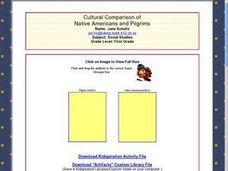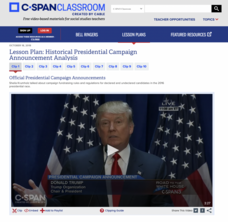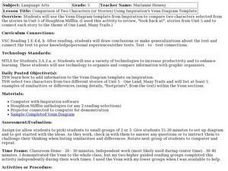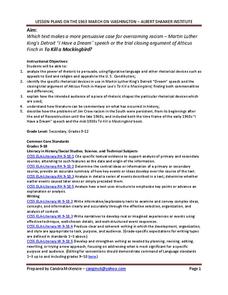Curated OER
Multiplication Strategies - A Day at the Zoo
This is an amazing 33-page resource for teaching multiplication! Your mathematicians will discover the connection between multiplication and repeated addition. They also will work collaboratively with arrays while studying zoo animals....
Curated OER
Number Value Assessment
Quiz your second graders with this set of math worksheets involving place value, word problems, number sequence, greater than/less than, coin value, expanded form, and much more! Most have multiple choice answers provided, and generally...
Curated OER
CULTURAL COMPARISON OF NATIVE AMERICANS AND PILGRIMS
First graders explore the practices and products of the two cultures. They build log cabins and teepees or Hogans, make costumes, use vocabulary and Native American symbols to write stories, create art products such as pinch pots and...
Curated OER
Comparison of Different Methods for Determining Stream Flow at a Stream Site
Students make measurements and calculations to determine the stream flow of an outdoor stream site. In this stream characteristics lesson, students travel to a field site to construct a transect across a stream and measure the stream's...
Curated OER
Poetry - Landscape, Comparison, and Critical Response
Students compare and evaluate landscape poetry. In this poetry lesson plan, students read poetry by Owen Sheers that describes place/landscapes. They read and compare two similar poems before looking at visual images related to the...
Curated OER
Comparison of Adjectives
For this comparative and superlative adjective online worksheet, students watch two YouTube videos about the different types of adjectives. They fill in the blanks in 20 sentences with the correct comparative adjectives. They complete a...
Curated OER
Smart Consumers, Smart Choices
High schoolers see what it means to be a smart consumer by engaging in a level-headed analysis of budget, opportunity costs and self-regulation. They compare prices within a service field, and weigh the choices of spending money on that...
Curated OER
Making It Balance
Students listen to story, "The 100-Pound Problem," compare their weight with character in story, and weigh different classroom items using nonstandard units and standard units. They experiment with different items that can make scale...
Balanced Assessment
Classroom Groups
How many different ways can a teacher organize a class into groups? In a grouping activity, learners explore the number of possible combinations of groups given different total participants and size criteria. They then make comparisons...
Curated OER
Root Caps and the Effect on Gravity Sensing
Students conduct an experiment to determine how the absence of a root cap affects a plant's ability to sense gravity. They make comparisons between capped and decapped roots.
Curated OER
Slavery: Population Growth in Arkansas
Eighth graders examine the number of slaves in Arkansas in each census period from 1820 to 1860. They graph the data using the proper labeling and write a paragraph summarizing the data from each period making comparisons between slave...
Curated OER
Representation: Elections
Students study and examine how elections are conducted in Australia. In this representation lesson plan, students make comparisons regarding systems of voting. Students explore the three levels of government and discuss federal...
iCivics
Municipal Government: High School
Municipal government takes on many roles, not just the ones we are used to hearing about such as Parks and Recreation. Scholars delve into the topic to get a grasp on how the government system functions. They participate in readings,...
Curated OER
Comparison of Snow Cover on Different Continents
Students use the Live Access Server (LAS) to form maps and a numerical text file of snow cover for each continent on a particular date and analyze the data for each map, corresponding text file to determine an estimate of snow cover for...
C-SPAN
Historical Presidential Campaign Announcement Analysis
Using the announcements of presidential candidacies, pupils consider how contenders make their initial arguments to the public. A worksheet helps structure collaborative work to analyze 10 video clips. Writing prompts allow for extension...
Curated OER
Mobile vs. Money
Students research the internet and use the information they find to plot straight line graphs. They use graphs to make comparisons of the various packages offered. Students interpret graphs and solve problems based on varying parameters.
Curated OER
Comparison of Two Characters Using Venn Diagram
Fifth graders compare characters of stories using venn diagrams. The use of technology is integrated into the lesson to meet a standard and engage learners.
Prestwick House
Analyzing Multiple Interpretations of Literature
There is a reason why an Oscar is given each year for the Best Adaptation Screenplay. Adaptations are the focus of an exercise that asks class members to compare a work of literature with a least one adaptation of the work into a...
Curated OER
Delve Into the Metaphorical Mind
There are many ways to teach metaphors — all are gold to our young learners.
Achieve3000
Figurative Language
Similes and metaphors make writing more beautiful and detailed, but can be a little harder to decipher during a first reading. Use a passage from The Man Who Loved Words to show young readers how to think through passages that contain...
Curated OER
Applied Science - Science and Math Lab
Create three dimensional objects in an applied science lesson. The goal is for your class to recognize, compare, and model shapes. Using cookie cutters and clay or play dough, they create models for three-dimensional shapes.
Curated OER
The Perfect Pet
Students take on role of an associate in a pet shop and help imaginary customers compare pets for sale.
Albert Shanker Institute
Making the Case for Equality: A Comparison
Martin Luther King Jr's " I Have a Dream" speech and Atticus Finch's closing argument during the trial of Tom Robinson both address the societal need to overcome racism. After examining the rhetorical devices and figurative language used...
Computer Science Unplugged
Lightest and Heaviest—Sorting Algorithms
How do computers sort data lists? Using eight unknown weights and a balance scale, groups determine the order of the weights from lightest to heaviest. A second worksheet provides the groups with other methods to order the weights. The...

























